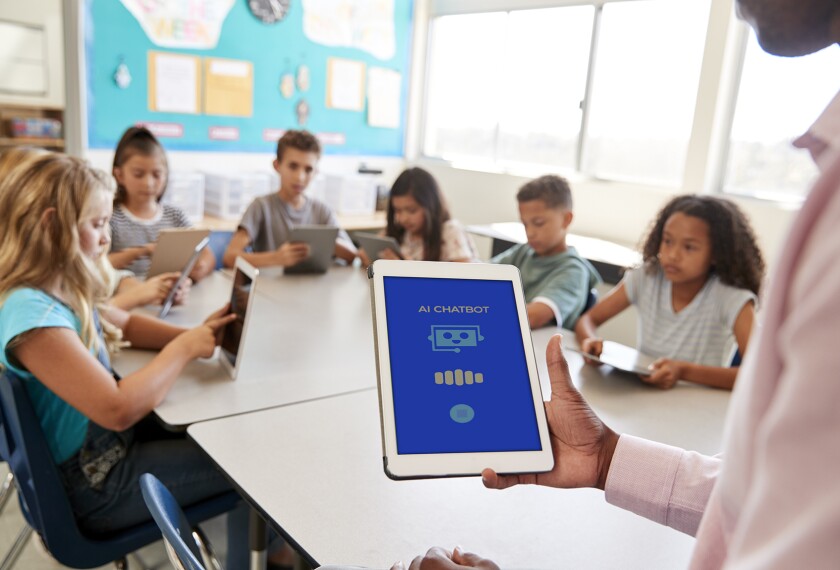Artificial intelligence could revolutionize how people with dyslexia navigate K-12 schools and the rest of the world, said Josh Clark, the leader of the Landmark School, a private school in Massachusetts serving children with the condition and other language-based learning differences.
Clark is also the chairman of the board of the International Dyslexia Association, and is dyslexic himself. He believes AI could power new learning tools for students with dyslexia and help them write and communicate in a way that showcases their strengths. The impact could be significant, given that up to 20 percent of the U.S. population has dyslexia.
Education Week interviewed Clark over Zoom about the potential he sees in AI for students with dyslexia. This interview has been edited for length and clarity.

You’ve said you see a lot of potential for AI for students with dyslexia. Can you explain why?
I’m kind of obsessed with the idea that the world just became so much better at writing, spelling, written communication, the things that dyslexic kids have such a hard time with. And what does that look like? What does that mean? How [do] we think of AI as an instructional tool, but also, as an assistive technology?
As somebody who has really struggled with dyslexia, I know you can be 15 years old and writing like a 3rd grader when it comes to spelling, grammar, syntactical errors. AI tools could allow students to display their actual abilities and their actual intellect by helping with those issues.
I do think AI is going to challenge the traditional educational system in so many ways, and I think for the good. I want to ensure that we are building systems that represent all learners, not just your traditional learner and the way a traditional learner processes information.
AI is only as good as the information and the data that we feed into it. So it’s essential that data representing how kids with learning differences think and process information is included.
You see more opportunity to reach students with dyslexia and other learning differences. What might that look like in a classroom?
AI could help create a very powerful reading tool.
Imagine a world where a 3rd grader is able to sit down in front of a computer and a text is generated for them based on past performance, where there’s very specific vocabulary, very specific spelling patterns, a decodable text that we know aligns with where they are, and also pushes them to a threshold that they can handle and at the same time, it’s about something that they love and have a high interest in. It’s about baseball, or it’s about “Star Wars,” or whatever it is.
Meanwhile, there could also be a floating AI coach supporting them along the way and that AI coach is Spider Man or it’s Cinderella or whoever it is this child finds motivating and captivating, and exciting. I think we have such an opportunity around motivation, which is so important for a kid with learning differences. A kid that’s sitting in class and thinking “This makes no sense to me. This is hard for me.”
How do we ensure that students with dyslexia are using AI as a coach or assistant and not just passing off what it produces as their own work?
Many kids with dyslexia tend to have proportionately higher verbal abilities. So not all, but many have high levels of verbal expression, high levels of vocabulary. But they may have difficulty expressing themselves in writing.
Let’s say I was writing a paper. I’d tell an AI tool ‘“This is the kind of thing I want to say” And the AI can be my own kind of personal writing coach to say ‘Okay, these all sound like great ideas. What do you think might be the best way to introduce them? What might you want to start with?’ Et cetera. So now I suddenly have this exchange which is building on my strengths and verbal abilities.
Then I have a draft. I’m going to put in an AI tool and say ‘Okay, would you look at this with me? Give me some feedback on grammar.’ Suddenly all the steps of the writing process are individualized and at my fingertips.
It takes away a level of shame. An AI tool is not going to judge me on my spelling. It’s not going to say “Gosh, you’re in the 6th grade. You’re writing like a first grader. What’s wrong with you?”






